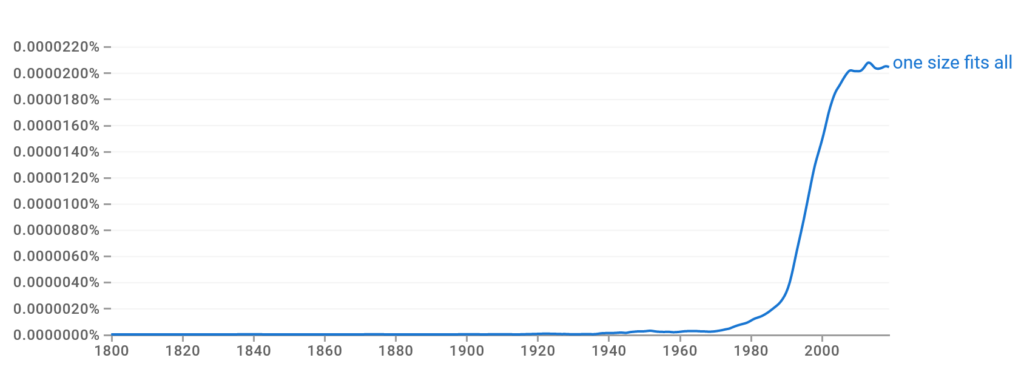One-size-fits-all is an idiom implying a universally applicable or effective standard solution or method. While the phrase originated from the fashion industry, its application has broadened significantly.
Idioms such as one-size-fits-all are figurative expressions that convey meanings beyond their literal interpretation. They are essential to the English language because they offer a way to share our confusing ideas in a simple, often metaphorical, manner that anyone can understand.
This article will break down the idiom’s meaning, its origin, related terms, and the different contexts in which it can be used effectively. Stick around and read to the end to uncover how this seemingly straightforward phrase holds diverse implications in various scenarios.

What Does the Idiom One-Size-Fits-All Mean?
The idiom one-size-fits-all means a universal solution or approach that’s deemed suitable for all circumstances. Merriam-Webster defines the phrase as something “designed to conform to all shapes and sizes.”
It originally referred to clothing that could fit people of various sizes. However, the idiom has been extended metaphorically to describe policies, strategies, or plans designed to be broadly effective or applicable.
Because I live and breathe everything writing and publishing, I always think of editing when I hear this term. Editing, in any form, is not a one-size-fits-all solution for perfecting a manuscript. You have to consider the author’s intentional spelling choices, nuances, regional slang, and so much more.
Literal Meaning vs. Figurative Meaning
The literal meaning of one-size-fits-all is a single size that accommodates everyone. Figuratively, it refers to a one-stop solution that usually overlooks the nuances and specific needs of individual cases.
How Is One-Size-Fits-All Commonly Used in Context?
This idiom is commonly used in diverse contexts, from business and education to technology and social policy. Let’s take a closer look at the ways you can incorporate this idiom into your vocabulary.
What Are the Different Ways to Use One-Size-Fits-All?
- Product marketing: “Our new software offers a one-size-fits-all solution for businesses of all sizes.”
- Clothing and accessories: “The company introduced a one-size-fits-all hat that adjusts to different head sizes.”
- Policy or rule: “The organization implemented a one-size-fits-all policy to streamline procedures.”
- Educational programs: “The online course is designed as a one-size-fits-all program, catering to learners with diverse backgrounds.”
- Health and wellness: “The fitness app claims to provide a one-size-fits-all workout routine suitable for everyone.”
- Technology and software: “The new app boasts a one-size-fits-all design, ensuring user-friendly navigation for all age groups.”
- Management strategies: “The manager adopted a one-size-fits-all approach to team motivation.”
- General statements: “His philosophy was not a one-size-fits-all solution; he believed in tailoring advice to individual needs.”
Remember, the usage of this idiom implies broad, general applicability that may not consider specific individual differences or preferences.
What Are Some Tips for Using One-Size-Fits-All Effectively?
- Consider the context: Assess whether the context truly supports a universal, one-size-fits-all solution or if there are nuances that need acknowledgment.
- Clarify limitations: If there are limitations or exceptions to the universality claimed by the idiom, clarify them to avoid potential misunderstandings.
- Be mindful of individual differences: Recognize that people or situations may have unique characteristics, and a one-size-fits-all approach may not address everyone’s needs.
- Use in marketing with caution: Be transparent about the capabilities and limitations of the product or service to build trust with consumers.
- Adapt language for the audience: Tailor the use of the idiom to your audience, ensuring it resonates with their understanding and expectations.
Where Can You Find Examples of One-Size-Fits-All?
Examples of one-size-fits-all can be found in various contexts, such as the clothing industry, software solutions, educational approaches, management policies, and health and fitness.
We can also find it used in online publications, including:
Sen. Jim Perry, a Republican from Kinston who represents two of the eight eastern counties asking Cooper to reopen more quickly, said the state no longer needs a one-size-fits-all approach to coronavirus. (The Raleigh News & Observer)
“The people of North Carolina will suffer needless health and economic harm if the State continues to treat its diverse population with a one-size-fits-all approach.” (The Charlotte Observer)
“One of the biggest mistakes a leader can make is blindly following a prescriptive list of one-size-fits-all tips and solutions for remote work,” says Stan Vlasimsky, Vice President at consultancy Pariveda Solutions—a firm focused on digital transformation, helping clients leveraging technology to achieve business outcomes. (Forbes Magazine)
What Is the origin of the Idiom One-Size-Fits-All?

The expression one-size-fits-all comes from the garment industry. By the 1970s, many retailers carried oversized or billowing items; they were designed to fit a range of sizes. By the 1990s, companies experienced a backlash from people who did not fall within the range of sizes for a one-size-fits-all item.
Most ready-to-wear designers began using the designation: one-size-fits-most. It was just about this time when the popularity of the idiom one-size-fits-all really took off.
How Did the Idiom Evolve Over Time?
Over time, the expression has expanded beyond the fashion industry and is now used more broadly to describe any product, solution, or approach claiming to be universally applicable or suitable for various situations or individuals. It has become a metaphor for a one-size solution that supposedly fits everyone, regardless of differences in preferences, needs, or circumstances.
What Are Some Related Terms to One-Size-Fits-All?
Use these alternatives and opposite terms to describe the idea of something all-encompassing (or lack thereof).

Synonyms
- Universal solution
- Uniform
- Blanket approach
- All-encompassing
- Universal
- Equal to all
Antonyms
- Tailored
- Customized
- Specific
One Size Fits All: Test Your Knowledge!
Choose the correct answer.
What Have We Learned About One-Size-Fits-All?
To sum things up, one-size-fits-all is more than just a fashion term; it’s a metaphor you can use in life to describe universal solutions. We broke down details about its meaning and origin and also covered examples and variations you can use, too. I hope you have a better understanding now! Check out my other idiom guides and really beef up your vocab!
